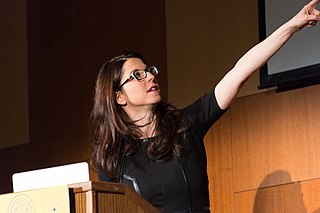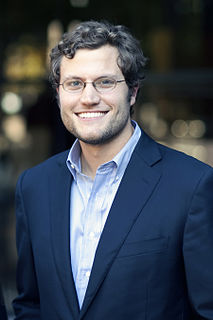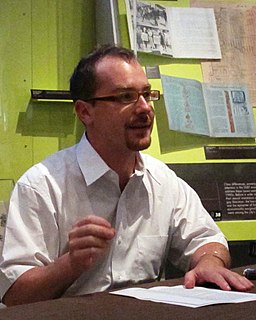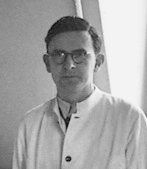Top 356 Cognitive Quotes & Sayings - Page 6
Explore popular Cognitive quotes.
Last updated on April 21, 2025.
A general “law of least effort” applies to cognitive as well as physical exertion. The law asserts that if there are several ways of achieving the same goal, people will eventually gravitate to the least demanding course of action. In the economy of action, effort is a cost, and the acquisition of skill is driven by the balance of benefits and costs. Laziness is built deep into our nature.
In fact, without a specification of a creature's goals, the very idea of intelligence is meaningless. A toadstool could be given a genius award for accomplishing with pinpoint precision and unerring reliability, the feat of sitting exactly where it is sitting. Nothing would prevent us from agreeing with the cognitive scientist Zenon Pylyshyn that rocks are smarter than cats because rocks have the sense to go away when you kick them.
It has been an obsession of human beings to create a hierarchy that places the human species on top and lumps all the "other animals" together beneath us. The resulting "speciesism" allows us to look upon animals as less deserving of all manner of rights and considerations than humans. To support this lower status, humans have argued that animals act instinctually; don't have souls; don't feel physical pain like we do; and lack self-consciousness, cognitive intelligence, emotional feelings, morality, and ethics.
Myths, whether in written or visual form, serve a vital role of asking unanswerable questions and providing unquestionable answers. Most of us, most of the time, have a low tolerance for ambiguity and uncertainty. We want to reduce the cognitive dissonance of not knowing by filling the gaps with answers. Traditionally, religious myths have served that role, but today — the age of science — science fiction is our mythology.
The great cognitive shift is an expansion of consciousness from the perspectival form contained in the lives of particular creatures to an objective, world-encompassing form that exists both individually and intersubjectively. It was originally a biological evolutionary process, and in our species it has become a collective cultural process as well. Each of our lives is a part of the lengthy process of the universe gradually waking up and becoming aware of itself.
Just as man's physical existence was liberated when he grasped that 'nature, to be commanded, must be obeyed', so his consciousness will be liberated when grasps that nature, to be apprehended, must be obeyed - that the rules of cognition must be derived from the nature of existence and the nature, the identity, of his cognitive faculty.
The mental cognitive processes that we're targeting are ones that narrow human beings' repertoire and make it harder for them to learn to be more flexible, to take advantage of the opportunities in front of them. We can have something to help with in areas like child development or organizations and schools, or maybe even how peoples interact with each other, one to the other. We've taken the work into things like prejudice and stigma, because if we can't solve that we have planes flying into buildings. So it applies broadly because anywhere that a human mind goes these processes go.
Very little attention is paid to improving the decision-making skills of both individual executives and the organizational benchstrength as a whole. Often we find that this is overlooked because there is a common assumption the business executives have all the requisite cognitive skills they need when they come to work for the organization. The problem with that perspective is that it overlooks the fact that thinking skills can be learned and improved at any time during the course of a persons lifetime.
As long as I stared at the clock, at least the world remained in motion. Not a very consequential world, but in motion nonetheless. And as long as I knew the world was still in motion, I knew I existed. Not a very consequential existence, but an existence nonetheless. It struck me as wanting that someone should confirm his own existence only by the hands of an electric wall clock. There had to be a more cognitive means of confirmation. But try as I might, nothing less facile came to mind.
Decision-making is difficult because, by its nature, it involves uncertainty. If there was no uncertainty, decisions would be easy! The uncertainty exists because we don't know the future, we don't know if the decision we make will lead to the best possible outcome. Cognitive science has taught us that relying on our gut or intuition often leads to bad decisions, particularly in cases where statistical information is available. Our guts and our brains didn't evolve to deal with probabilistic thinking.
17th century philosophers were not in a position to understand the mind as well as we can today, since the advent of experimental methods in psychology. It shows no disrespect for the brilliance of Descartes or Kant to acknowledge that the psychology which they worked with was primitive by comparison with what is available today in the cognitive sciences, any more than it shows disrespect for the brilliance of Aristotle to acknowledge that the physics he worked with does not compare with that of Newton or Einstein.
Words can enhance experience, but they can also take so much away. We see an insect and at once we abstract certain characteristics and classify it - a fly. And in that very cognitive exercise, part of the wonder is gone. Once we have labeled the things around us we do not bother to look at them so carefully. Words are part of our rational selves, and to abandon them for a while is to give freer reign to our intuitive selves.
One of the most difficult problems of our age is that leaders, and perhaps academics as well, cannot readily admit that things are out of control and that we do not know what to do. We have too much information, limited cognitive abilities to think in systemic terms and an unwillingness to appear to be in control and to have solutions for our problems. We are afraid that if we admit to our confusion, we will make our followers and students anxious and disillusioned. We know we must learn how to learn, but we are afraid to admit it.
Work on causal theories of knowledge - early work by Armstrong, and Dretske, and Goldman - seemed far more satisfying. As I started to see the ways in which work in the cognitive sciences could inform our understanding of central epistemological issues, my whole idea of what the philosophical enterprise is all about began to change. Quine certainly played a role here, as did Putnam's (pre-1975) work in philosophy of science, and the exciting developments that went on in that time in philosophy of mind.
There's no such thing as advice to the lovelorn. If they took advice, they wouldn't be lovelorn. You see, advice and lovelorn don't go together. Because advice makes love sound like some sort of cognitive activity, but we know that it isn't. We all know that it's some sort of horrible chemical reaction over which we have absolutely no control. And that's why advice doesn't work.
If we take two people who have exactly the same sort of lesion or area of damage in the brain and then we do cognitive tests on them, you know, one person might have a very severe deficit in a certain area of thinking and another person might not with the same exact lesion. So there is a lot of differences and you can't just look at one brain and understand the whole picture.
Maybe philosophical problems are hard not because they are divine or irreducible or meaningless or workaday science, but because the mind of Homo sapiens lacks the cognitive equipment to solve them. We are organisms, not angels, and our minds are organs, not pipelines to the truth. Our minds evolved by natural selection to solve problems that were life-and-death matters to our ancestors, not to commune with correctness ot to answer any question we are capable of asking.
The fact that cognitive diversity matters does not mean that if you assemble a group of diverse but thoroughly uninformed people, their collective wisdom will be smarter than an expert's. But if you can assemble a diverse group of people who possess varying degrees of knowledge and insight, you're better off entrusting it with major decisions rather than leaving them in the hands of one or two people, no matter how smart those people are.
Sometimes people hold a core belief that is very strong. When they are presented with evidence that works against that belief, the new evidence cannot be accepted. It would create a feeling that is extremely uncomfortable, called cognitive dissonance. And because it is so important to protect the core belief, they will rationalize, ignore and even deny anything that doesn't fit in with the core belief.
If an epileptic seizure is focused in a particular sweet spot in the temporal lobe, a person won´t have motor seizures, but instead something more subtle. The effect is something like a cognitive seizure, marked by changes of personality, hyperreligiosity (an obsession with religion and feelings of religious certainity), hypergraphia (extensive writing on a subject, usually about religion), the false sense of an external presence, and, often, the hearing voices that are attributed to a god. Some fraction of history´s prophets, martyrs, and leaders appear to have had temporal lobe epilepsy.
To our human minds, computers behave less like rocks and trees than they do like humans, so we unconsciously treat them like people.... In other words, humans have special instincts that tell them how to behave around other sentient beings, and as soon as any object exhibits sufficient cognitive function, those instincts kick in and we react as though we were interacting with another sentient human being.
Comparing the three domains, I found that for jobs of all kinds, emotional competencies were twice as prevalent among distinguishing competencies as were technical skills and purely cognitive abilities combined. In general the higher a position in an organization, the more EI mattered: for individuals in leadership positions, 85 percent of their competencies were in the EI domain.
The scientific method is designed to help investigators overcome the most entrenched human cognitive habit: the confirmation bias, the tendency to notice and remember evidence that confirms our beliefs or decisions, and to ignore, dismiss, or forget evidence that is discrepant. That's why we are all inclined to stick to a hypothesis we believe in. Science is one way of forcing us, kicking and screaming if necessary, to modify our views.
We often say that someone has exceptional political or social savvy, but what specific cognitive skills allow these people to handle interpersonal situations so effectively? Typically, socially skilled people are exceptional at recognizing underlying agendas, anticipating the probable effects and likely unintended consequences of a chosen course of action. These specific capabilities determine one's "people smarts."
Cognitive states of mind are seldom addictive, since they depend upon exploration of the world, and the individual encounter with the individual object, whose appeal is outside the subject's control. Addiction arises when the subject has full control over a pleasure and can ponder it at will. It is primarily a matter of sensory pleasure, and involves a kind of short-circuiting of the pleasure network. Addiction is characterized by a loss of the emotional dynamic that would otherwise govern an outward-directed, cognitively creative life.
When speaking of a "body of knowledge" or of "the results of research," e.g., we tacitly assign the same cognitive status to inherited knowledge and to independently acquired knowledge. To counteract this tendency a special effort is required to transform inherited knowledge into genuine knowledge by revitalizing its original discovery, and to discriminate between the genuine and the spurious elements of what claims to be inherited knowledge.
The government ought to help out, because the average citizen can't go out and be doing reviews of the scientific literature. And focus on the processes that have low side effects and good long-term outcomes. Right now you're going to find those in the psychosocial area, in the therapy area, in the empirically supported treatments such as ACT or cognitive behavior therapy, behavior therapy. And go there first rather than going to the pill bottle as if it's going to be the end of your journey. Very often it's only going to help, and even only to a minor degree, and more is going to be needed.
The fact that only humans above a certain age can be morally virtuous, rather than babies or cats, means that that being moral requires some cognitive ability. If virtue is about desires, it is worth remembering that you can't desire some things without being able to conceive of them. Suppose a virtuous person will desire to make people happy and desire to tell the truth. You can't desire to make people happy without having the concept "happy" and you can't desire to be truthful if you don't have have the concept "lie", so a cat or a baby cannot desire these things.
Nature is a hanging judge," goes an old saying. Many tragedies come from our physical and cognitive makeup. Our bodies are extraordinarily improbable arrangements of matter, with many ways for things to go wrong and only a few ways for things to go right. We are certain to die, and smart enough to know it. Our minds are adapted to a world that no longer exists, prone to misunderstandings correctable only by arduous education, and condemned to perplexity about the deepest questions we can ascertain.
Deep attention, the cognitive style traditionally associated with the humanities, is characterized by concentrating on a single object for long periods (say, a novel by Dickens), ignoring outside stimuli while so engaged, preferring a single information stream, and having a high tolerance for long focus times. Hyper attention is characterized by switching focus rapidly among different tasks, preferring multiple information streams, seeking a high level of stimulation, and having a low tolerance for boredom.
Beginning with Santa Claus as a cognitive exercise, a child is encouraged to share the same idea of reality as his peers. Even if that reality is patently invented and ludicrous, belief is encouraged with gifts that support and promote the common cultural lies. The greatest consensus in modern society is our traffic systems. The way a flood of strangers can interact, sharing a path, almost all of them traveling without incident. It only takes one dissenting driver to create anarchy.
The difficulty in judging what type of behavior works well arises not only because a given course of action does not always produce the outcomes. Similar outcomes can occur for reasons other than the person's actions, which further complicates inferential judgment. Effects that arise independently of one's actions distort the influence of similar effects produced by the actions, but only on some occasions. Given a strong cognitive set to perceive regularities, even chance joint occurrences of events can be easily misjudged as genuine relationships of low contingent probability
What Warcollier demonstrated is compatible with what modern cognitive neuroscience has learned about how visual images are constructed by the brain. It implies that telepathic perceptions bubble up into awareness from the unconscious and are probably processed in the brain in the same way that we generate images in dreams. And thus telepathic “images” are far less certain than sensory-driven images and subject to distortion.
Epistemology now flourishes with various complementary approaches. This includes formal epistemology, experimental philosophy, cognitive science and psychology, including relevant brain science, and other philosophical subfields, such as metaphysics, action theory, language, and mind. It is not as though all questions of armchair, traditional epistemology are already settled conclusively, with unanimity or even consensus. We still need to reason our way together to a better view of those issues.
When you are thinking about whether you have an obligation to try to save people's lives, you don't usually think, well, how close by are they? Understanding what we are reacting to can change the way we think about the problem. If, biologically, morality evolved to help us get along with individuals in our community, it makes sense that we have heartstrings that can be tugged - and that they are not going to be tugged very hard from far away. But does that make sense? From a more reflective moral perspective, that may just be a cognitive glitch.
It is possible to be a fan of reality TV, talent shows and bubblegum pop and still have a brain. You will also see that a great many people know perfectly well how silly and camp and trivial their fandom is. They do not check in their minds when they enter a fan site. Judgement is not necessarily fled to brutish beasts, and men have not quite lost their reason. Which is all a way of questioning whether pop-culture hero worship is really so psychically damaging, so erosive of cognitive faculties, so corrupting of the soul of mankind as we are so often told.
Rationalization is a cover-up, a process of providing one's emotions with a false identity, of giving them spurious explanations and justifications - in order to hide one's motives, not just from others, but primarily from oneself. The price of rationalizing is the hampering, the distortion, and, ultimately, the destruction of one's cognitive faculty. Rationalization is a process not of perceiving reality, but of attempting to make reality fit one's emotions.
So when you're talking about lyrics in the context of music, it's not just about what the words mean, and what you were thinking about when you wrote it. It's not cognitive in that same way. It's almost like music turns words into touch, which is hard to describe, like the feeling of your shirt on your back. It's a pretty delicate thing to try to put into words. You just feel it.
When I give a concert, I know they're not going to hear everything; there might be a lot going on. My individual perceptual and cognitive path through the music is just that: one path through music. My experience will be probably at some level different from other people's, and that multiplicity of experience has to be supported by the music. I might just focus on the cowbell the whole time - maybe I have a fever for more cowbell!
The emergence of a unified cognitive moment relies on the coordination of scattered mosaics of functionally specialized brain regions. Here we review the mechanisms of large-scale integration that counterbalance the distributed anatomical and functional organization of brain activity to enable the emergence of coherent behaviour and cognition. Although the mechanisms involved in large-scale integration are still largely unknown, we argue that the most plausible candidate is the formation of dynamic links mediated by synchrony over multiple frequency bands.
Our relationship with sleep is currently in crisis, but we're also living in a golden age of sleep science - revealing all the ways in which sleep and dreams play a vital role in our decision-making, emotional intelligence, cognitive function, and creativity. Every week, new research reveals how vital sleep is to our health, happiness, job performance, and relationships.
Mood reflects the biology of the brain. How you feel is affected by the chemicals in the brain, and these are the same chemicals that form the basis of mood-altering drugs. You may use yoga, meditation, cognitive behaviour therapy (CBT) or exercise to alter your mood, or revert to healthy eating, regular exercise and getting enough sleep.
One theme that fascinates me is cognitive enhancement. It seems only a matter of time until we live in a world where steroids for the brain are readily available to all. And once we come to grips with that reality, I suspect the debate over the ethics will be much more heated than the debate over steroids in baseball or any other sport, where the use is limited to a select group of freakish athletes.
Friedrich Hayek .. seems to have been the first to postulate what is the core of this paper, namely, the idea of memory and perception represented in widely distributed networks of interconnected cortical cells. Subsequently this idea has received theoretical support, however tangential, from the fields of cognitive psychology, connectionism and artificial intelligence. Empirically, it is well supported by the physiological study and neuroimaging of working memory.
Regarding social order, [Francis] Fukuyama writes, "The systematic study of how order, and thus social capital, can emerge in spontaneous and decentralized fashion is one of the most important intellectual developments of the late twentieth century." He correctly attributes the modern origins of this argument to F. A. Hayek, whose pioneering contributions to cognitive science, the study of cultural evolution, and the dynamics of social change put him in the forefront of the most creative scholars of the 20th century.
Treatment Plans and Interventions for Depression and Anxiety Disorders provides clinicians with essential guidelines to treat patients in the era of managed care. Seven psychiatric disorders are described and conceptualized in cognitive-behavioral terms. The authors then provided an unusually clear, reader-friendly description of how to assess and treat each disorder with illustrative case examples, and patient forms and handouts. It should prove very useful for clinicians or clinicians-in-training who want to learn how to conduct short-term treatment through an empirically validated approach.
Ultimately, of course, you must decide for yourself whether the subjective psychological effects created by your evolved cognitive biases reflect an objective reality, perhaps as evidence that God designed your mind to be so receptive to Him. Or, just maybe, you will come to acknowledge that, like the rest of us, you are a hopeless pawn in one of natural selection's most successful hoaxes ever-and smile at the sheer ingenuity involved in pulling it off, at the very thought of such mindless cleverness. One can still enjoy the illusion of God, after all, without believing Him to be real.
The only position that leaves me with no cognitive dissonance is atheism. It is not a creed. Death is certain, replacing both the siren-song of Paradise and the dread of Hell. Life on this earth, with all its mystery and beauty and pain, is then to be lived far more intensely: we stumble and get up, we are sad, confident, insecure, feel loneliness and joy and love. There is nothing more; but I want nothing more.
I believe in goal-setting. I don't care what it is. If you want to drop 10 pounds, increase your bench press, jump higher, or win a Super Bowl, you have to set that goal for yourself before you go out and achieve it. I think you have to regulate it, and see how you're building toward it every single day. Am I getting closer to that ultimate goal? Am I doing everything I possibly can today to be successful? I'm always very cognitive of my goals.
There is a strong current in contemporary culture advocating ' holistic ' views as some sort of cure-all... Reductionism implies attention to a lower level while holistic implies attention to higher level. These are intertwined in any satisfactory description: and each entails some loss relative to our cognitive preferences, as well as some gain... there is no whole system without an interconnection of its parts and there is no whole system without an environment.
An immune system of enormous complexity is present in all vertebrate animals. When we place a population of lymphocytes from such an animal in appropriate tissue culture fluid, and when we add an antigen, the lymphocytes will produce specific antibody molecules, in the absense of any nerve cells. I find it astonishing that the immune system embodies a degree of complexity which suggests some more or less superficial though striking analogies with human language, and that this cognitive system has evolved and functions without assistance of the brain.
When we multi-task, we are motivated by a desire to be more productive and more efficient. We're often doing things that are automatic, that require very little cognitive processing... Continuous partial attention describes how many of us use our attention today... to pay partial attention - continuously. It is different from multi-tasking.
How can we encourage other human beings to extend their moral sympathies beyond a narrow locus? How can we learn to become mere human beings, shorn of any more compelling national, ethnic, or religious identity? We can be reasonable. It is in the very nature of reason to fuse cognitive and moral horizons. Reason is nothing less than the guardian of love.
Without the instruments and accumulated knowledge of the natural sciences... humans are trapped in a cognitive prison. They are like intelligent fish born in a deep shallowed pool. Wondering and restless, longing to reach out, they think about the world outside. They invent ingenious speculations and myths about the origin of the confining waters, of the sun and the sky and the stars above , and the meaning of their own existence. But they are wrong, always wrong because the world is too remote from ordinary experience to be merely imagined.
The cognitive therapy that takes place in the film Antichrist is a form of therapy that I have used for some time, and it has to do with confronting your fears. I would say that especially the part of the film that has to do with therapy is humoristic because people who know about this form of therapy would know that the character is more than a fool.
Suicide rates have not slumped under the onslaught of antidepressants, mood-stabilizers, anxiolytic and anti-psychotic drugs; the jump in suicide rates suggests that the opposite is true. In some cases, suicide risk skyrockets once treatment begins (the patient may feel not only penalized for a justifiable reaction, but permanently stigmatized as malfunctioning). Studies show that self-loathing sharply decreases only in the course of cognitive-behavioral treatment.
















































